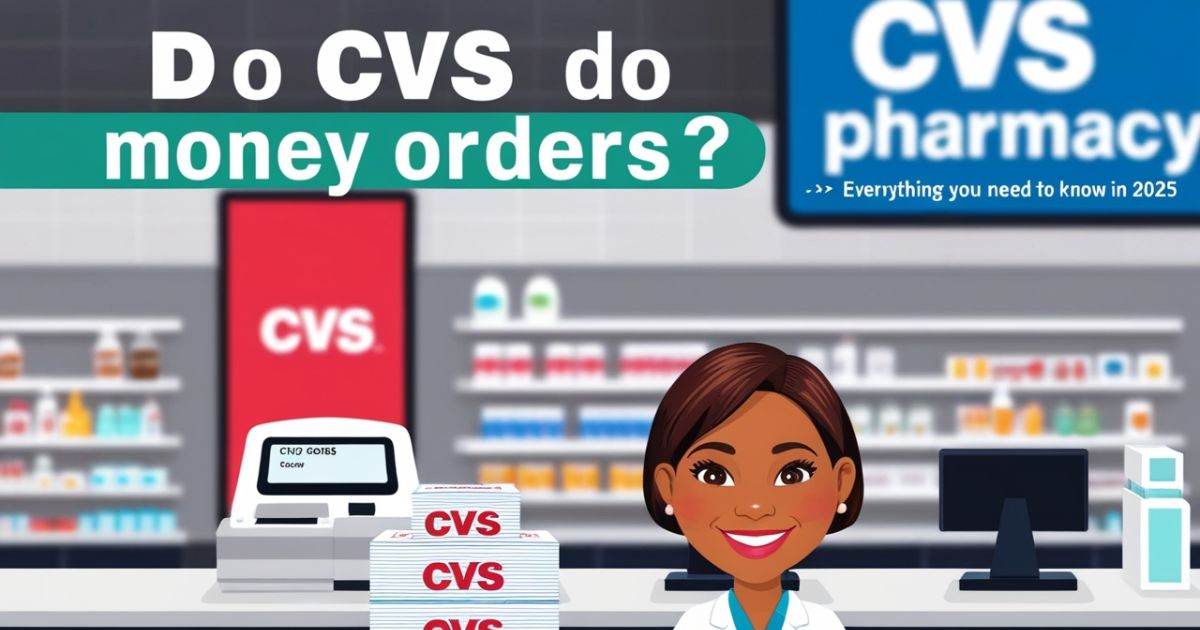Learn about CVS’s money order services, including availability, fees, payment methods, and alternatives for secure transactions.
Money orders remain a vital financial tool for millions of Americans, especially those without traditional banking relationships or who need a secure alternative to personal checks. As a guaranteed form of payment, money orders provide security that cash cannot offer and reliability that personal checks sometimes lack.
When you need to send money safely or make a payment that requires guaranteed funds, knowing where to obtain a money order conveniently can save you considerable time and effort.
CVS Pharmacy, with over 9,900 locations across the United States, has positioned itself as more than just a pharmacy chain. The retailer has expanded its services to include various financial products, making it a convenient destination for customers seeking one-stop shopping experiences.
This comprehensive guide examines whether CVS offers money order services and provides detailed information about their purchase, use, and alternatives to help you make informed financial decisions.
Money Order Availability at CVS
Yes, CVS does offer money orders through their partnership with MoneyGram, one of the leading money transfer services in the United States. This collaboration allows CVS to provide reliable money order services at most of its locations nationwide.
The availability of money orders at CVS represents the company’s broader strategic initiative to diversify beyond pharmaceutical services and meet more of their customers’ everyday needs under one roof.
Purchasing a money order at CVS is a straightforward process that typically takes only a few minutes. Customers need to visit the store’s customer service desk, where a representative will assist with completing the necessary form.
You’ll need to specify the amount, provide the recipient’s name, and complete your payment. One significant advantage of choosing CVS for your money order needs is their extended business hours.
Unlike traditional banks that typically operate from 9 AM to 5 PM on weekdays with limited weekend hours, many CVS locations remain open late into the evening and on weekends, offering greater flexibility for those with busy schedules or non-traditional work hours.
Payment Methods
When purchasing a money order at CVS, it’s important to understand the acceptable payment methods to avoid any inconvenience. CVS accepts two primary forms of payment for money orders: cash and debit cards. These restrictions exist to ensure that the funds being used are guaranteed and immediately available.
Cash remains the most straightforward payment method for money order purchases at CVS. When using cash, you’ll need to provide the exact amount covering both the money order value and the associated fee.
This method is particularly popular among individuals without bank accounts or those who prefer to manage their finances using cash. Debit cards offer a convenient alternative to cash payments at CVS.
When using a debit card, the transaction draws funds directly from your linked checking account. This payment method provides additional security since you don’t need to carry large amounts of cash.
Furthermore, debit card transactions create a digital record of your purchase, which can be helpful for tracking purposes or if you need to resolve any disputes in the future.
Notably, credit cards are not accepted for money order purchases at CVS. This policy aligns with the practices of most money order providers and exists to prevent potential chargebacks and ensure the funds are guaranteed.
Credit card companies typically categorize money order purchases as cash advances, which often incur high fees and interest rates, making them an expensive option even when available elsewhere.
Transaction Fees and Amount Caps
The transaction fees for money orders at CVS remain competitive when compared to other providers in the market. Typically, CVS charges a fee of approximately $1.25 per money order, though this amount may vary slightly depending on location.
This fee structure positions CVS as one of the more affordable options for money order services, especially when compared to some banks that charge non-account holders significantly higher fees.
CVS maintains a maximum limit of $500 per money order, which is standard among many retail providers. This cap exists to comply with financial regulations and minimize fraud risks.
For transactions exceeding this amount, customers must purchase multiple money orders, with each incurring a separate fee. For example, if you need to send $1,200, you would need three money orders ($500 + $500 + $200), resulting in a total fee of approximately $3.75.
The following table compares CVS money order fees and limits with other common providers:
| Provider | Maximum Amount | Fee |
| CVS (MoneyGram) | $500 | $1.25 |
| U.S. Postal Service | $1,000 | $1.45-$1.95 |
| Western Union | $1,000 | $1.50+ |
| Typical Bank/Credit Union | $1,000+ | $5-10 (often free for account holders) |
While the per-transaction limit may seem restrictive, it’s worth noting that there typically isn’t a daily limit on the number of money orders you can purchase at CVS.
However, financial regulations require additional documentation for multiple large transactions, which we’ll discuss in the next section.
Documentation Requirements
To purchase a money order at CVS, you must present valid government-issued identification. This requirement ensures compliance with federal financial regulations designed to prevent fraud and money laundering.
Acceptable forms of identification typically include a driver’s license, state ID, or passport. The identification document must be current (not expired) and contain your photograph.
For larger transactions or when purchasing multiple money orders that collectively exceed certain thresholds (typically $3,000 in a single day or multiple related transactions), CVS may require additional information such as your Social Security Number (SSN).
This requirement aligns with the IRS regulations and the Bank Secrecy Act, which mandate financial institutions to report large cash transactions to help prevent money laundering and other financial crimes.
It’s also important to note that when filling out the money order, you’ll need to provide accurate information about both the purchaser (yourself) and the recipient. The money order will include fields for the purchaser’s address and the recipient’s name.
While the recipient’s address isn’t typically required on the money order itself, having this information on hand can be helpful if you’re also purchasing an envelope to mail the money order.
CVS retains records of money order transactions, including copies of identification documents, for a period determined by state and federal regulations. These records are maintained for security purposes and may be accessed if issues arise with the transaction in the future.
Read This Post: I Lost My 5071C Letter. How Can I Get a Replacement?
Refunds and Cancellations
If circumstances change and you need to request a refund or cancellation for a money order purchased at CVS, it’s important to understand that the process is handled through MoneyGram rather than CVS directly. CVS serves as the selling agent for MoneyGram money orders but does not process refunds or replacements.
To initiate a refund or cancellation, you must have the original receipt containing the tracking number of the money order. This number is essential for MoneyGram to locate your specific transaction in their system.
Without this receipt, the process becomes significantly more complicated and may require additional verification steps. The cancellation process requires completing a MoneyGram Money Order Claim Card, which can be obtained from the MoneyGram website or by contacting their customer service.
This form must be filled out completely and submitted along with the required fee. MoneyGram charges a non-refundable processing fee of approximately $18 for this service, regardless of whether the money order is ultimately located and refunded.
It’s important to note that refunds can only be processed if the money order has not been cashed by the recipient. Once cashed, the money order cannot be refunded.
The processing time for refund requests typically ranges from 20 to 60 days, depending on the complexity of the case and whether you have all the required documentation. If you’ve lost both the money order and the receipt, you can still request a refund, but the process becomes more challenging.
You’ll need to provide MoneyGram with as much information as possible about the purchase, including the date, location, amount, and any other details that might help identify the transaction. In such cases, the processing time is typically longer, and approval is not guaranteed.
Alternative Money Order Providers
While CVS offers convenient money order services, several alternative providers exist, each with distinct advantages depending on your specific needs. Understanding these options can help you make the most cost-effective choice for your situation.
The U.S. Postal Service (USPS) remains one of the most trusted money order providers in the country. USPS money orders cost $1.45 for amounts up to $500 and $1.95 for amounts between $500.01 and $1,000.
One significant advantage of USPS money orders is their higher maximum limit of $1,000 per money order, compared to CVS’s $500 cap. Additionally, postal money orders are backed by the federal government, which may provide additional peace of mind for both senders and recipients.
Traditional banks and credit unions also offer money order services, often with higher maximum limits than retail providers. If you maintain an account with a financial institution, you might receive money orders at reduced fees or even free of charge.
Bank-issued money orders generally range from $5 to $10 for non-account holders but are frequently offered as a complimentary service for account holders. The primary disadvantage of banking institutions is their limited business hours compared to retail locations like CVS.
Western Union provides money order services through numerous retail locations, with fees typically starting around $1.50. Western Union’s advantage lies in its global recognition and acceptance, making it particularly useful for recipients who may be unfamiliar with other money order providers.
They also offer higher transaction limits at some locations, which may be beneficial for larger payments. For those specifically looking for alternatives to CVS within the retail pharmacy sector, chains like Walmart and some grocery stores also offer money order services, often with competitive fees and similar convenience factors.
When selecting a money order provider, consider factors such as:
- Location convenience and business hours
- Fee structure
- Maximum amount limits
- Your relationship with the provider (e.g., whether you’re a bank account holder)
- How quickly the recipient needs the funds
- The recipient’s familiarity with the money order provider
FAQ’s
What do you need for a money order at CVS?
To purchase a money order at CVS, you need valid government-issued photo ID, payment for both the money order amount and service fee ($1.25), and the recipient’s name. Cash and debit cards are accepted, but credit cards are not.
Does CVS do money orders with a credit card?
No, CVS does not accept credit cards for money order purchases due to chargeback risks and to ensure funds are guaranteed. Cash and debit cards are the only payment methods accepted for CVS money orders.
What information do you need to cash a money order?
To cash a money order, you need valid government-issued photo ID and your signature on the back matching the recipient name. Some locations charge a fee ranging from 1-5% of the money order amount for non-account holders.
Can I purchase a money order with a debit card?
Yes, CVS accepts debit cards for money order purchases. The transaction draws funds directly from your checking account, requiring your PIN for verification and creating a digital record of the purchase in your bank statement.
Conclusion
CVS offers convenient money orders via MoneyGram with competitive $1.25 fees and $500 limits per transaction. Their extended hours provide flexibility unavailable at traditional banks. When choosing a provider, consider your specific needs regarding amount, convenience, and cost.

Hello, I’m Nadeem Sattar, a contributing editor at Opals Magazine. I navigate the intersection of Finance and Technology, delivering insightful analysis and forward-thinking perspectives. Join me on OpalsMAgazine.com for expert coverage of financial innovations, investment strategies, and emerging technologies reshaping our economic landscape.








